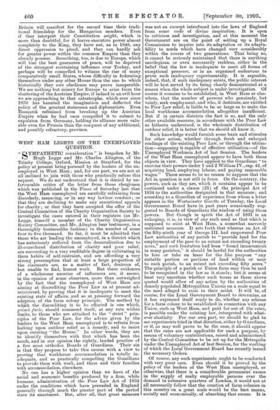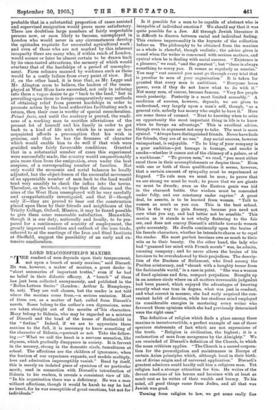WEST HAM LIGHTS ON THE UNEMPLOYED QUESTION.
" SYMPATHETIC consideration" is bespoken by Mr. Hugh Legge and Mr. Charles Alington, of the Trinity College, Oxford, Mission at Stratford, for the policy at present being pursued by the leaders of the un- employed in West Ham ; and, for our part, we are not at all inclined to join with those who practically refuse this request. We do not understand that it is denied by un- favourable critics of the letter from those clergymen which was published in the Times of Saturday last that the West Ham unemployed are carefully refraining from disorderly, menacing, or in any way lawless conduct ; or that they are declining to make any sensational appeals for charity ; or that they have accepted the offer of the Central Committee of the Charity Organisation Society to investigate the cases entered in their registers (as Mr. Legge, himself a member of the Charity Organisation Society Committee, and Mr. Alington bear testimony, in a thoroughly businesslike fashion) to the number of some four to five thousand. So far, it must be admitted that those who are leading the unemployed, in a district which has notoriously suffered from the demoralisation due to ill-considered distribution of charity and poor relief, are succeeding to a very creditable degree in cultivating in them habits of self-restraint, and are affording a very strong presumption that at least a large proportion of the claimants are, as a matter of fact, desirous of, but unable to find, honest work. But these evidences of a wholesome exercise of influences are, it seems, in the opinion of some observers, more than outweighed by the fact that the unemployed of West Ham are aiming at discrediting the Poor Law as at present ad- ministered, by proving that it is inadequate to meet the existing state of affairs, and so at pressing forward the adoption of the farm colony principle. The method by which the discrediting is to be effected is one which, prima facie, should commend itself, at any rate within limits, to those who are attached to the " strict " prin- ciples of the Poor Law, for the advice given by the leaders to the West Ham unemployed is to refrain from logking upon outdoor relief as a remedy, and to insist upon entering "the House." In other words, they are to identify themselves with that which has been the much, and in our opinion the rightly, lauded practice of a few most orthodox Boards of Guardians. Their sin is that they propose to take this course with a view to proving that workhouse accommodation is totally in- adequate, and so practically compelling the Guardians to provide them with work, and them and their families with accommodation, elsewhere.
No one has a higher opinion than we have of the social and economic benefits produced by a firm, while humane, administration of the Poor Law Act of 1834 under the conditions which have prevailed in England generally through much the greater part of the period since its enactment. But, after all, that great measure was not an excerpt introduced into the laws of England from some code of divine inspiration. It is open to criticism and investigation, and at this moment the Government are on the point of setting up a Royal Commission to inquire into its adaptation or its adapta- bility to needs which have changed very considerably within the course of two generations. That being so, it cannot be seriously maintained that there is anything sacrilegious, or even necessarily reckless, either in the belief that the law is inadequate to meet all forms of exceptional pressure, or in an organised endeavour to prove such inadequacy experimentally. It is arguable, indeed, that, if such inadequacy exists, the public interest will be best served by its being clearly demonstrated at a season when the whole subject is under investigation. Of course it remains to be established, in West Ham or else- where, that the number of persons who genuinely, but vainly, seek employment, and who, if destitute, are entitled to Poor Law relief, is liable to be so large as to make the local workhouse accommodation altogether insufficient. But if in certain districts the fact is so, and the only other available resource, in accordance with the Poor Law as hitherto understood, is the wholesale distribution of outdoor relief, it is better that we should all know it.
Such knowledge would furnish some basis and stimulus for other action, whether through fresh and enlarged readings of the existing Poor Law, or through the utilisa- tion—supposing it capable of effective utilisation—of the Unemployed Workmen Act of last Session. The leaders of the West Ham unemployed appear to have both these objects in view. They have applied to the Guardians " to exercise their powers under 1 and 2 William IV., cap. 42, of acquiring land, employing labour, and paying reasonable wages." There seems to be no reason to suppose that the Act in question is not still in force. On the contrary, the powers, such as they are, which it contains appear to be continued under a clause (21) of the principal Act of 1834 to the authorities designated in that measure; and according to a Guardian of experience from whom a letter appears in the Westminster Gazette of Tuesday, the Local Government Board have in past years occasionally sug- gested to Boards of Guardians the wisdom of using those powers. But though in spirit the Act of 1831 is an enlarging, it is, in view of any such need as that which is supposed to exist at West Ham, as somewhat narrowly restricted measure. It sets forth that whereas an Act of the fifty-ninth year of George III. had empowered Poor Law authorities of any parish to " provide land for the employment of the poor to an extent not exceeding twenty acres," and such limitation had been " found inconvenient in many parishes," it should be lawful for the authorities to hire or take on lease for the like purpose " any suitable portion or portions of land within or near to such parish, to an extent not exceeding fifty acres."
The principle of a parish or Union farm may thus be said to be recognised in the law as it stands ; but it seems at least very uncertain whether such terms as those above quoted would allow of any action by the authorities of densely populated Metropolitan Unions on a scale equal to the need alleged to exist in their midst. It will be, of course, for the Local Government Board to determine, as it has expressed itself ready to do, whether any scheme for a farm colony to be established in connection with any Union, such as West Ham, and paid for out of the rates, is possible under the existing law, interpreted with what- ever elasticity. For our own part, we should be glad to see experiments tried in that direction, either by Guardians, or if, as may well prove to be the case, it should appear that the rates are not applicable for such a purpose, by means of voluntary contributions, raised and administered by the Central Committee to be set up for the Metropolis under the Unemployed Act of last Session, for the working of which the Local Government Board has recently issued the necessary Orders. - Of course, any such experiments ought to be conducted with very great care. Even should it be proved by the policy of the leaders of the West Ham unemployed, or otherwise, that there is a considerable permanent. excess in the supply of really employable persons over the demand in extensive quarters of London, it would not at all necessarily follow.that the creation of farm colonies in this country on, a great scale would be the best means, socially and economically, of absorbing that excess. It is probable that in a substantial proportion of cases assisted and supervised emigration would prove more satisfactory. There are doubtless large numbers of fairly respectable persons now, or soon likely to become, unemployed in London who would never in any circumstances develop the aptitudes requisite for successful agricultural work ; and even of those who are not marked by this inherent incapacity there are many who, if within reach of London, would sooner or later be almost certain to be drawn back by its once-tasted attractions, the memory of which would overbear that of the hardships of a period of unemploy- ment. Farm colonies manned by workmen such as these would be a costly failure from every point of view. But if, on the other hand, it is true that, as Mr. Legge and Mr. Alington seem to believe, the leaders of the unem- ployed at West Ham have succeeded, not only in infusing into them a vague desire to go " back to the land," but in prevailing upon them to forego comparatively easy methods of obtaining relief from present hardships in order to promote action by the local authorities facilitating such a return, then their case is worthy of special consideration. Primd facie, and until the contrary is proved, the readi- ness of a working man to sacrifice alleviations of the present lot of himself and his family in order to get back to a kind of life with which he is more or less acquainted affords a presumption that his wish is genuine, and that he has the firmness of character which would enable him to do well if that wish were gratified under fairly favourable conditions. Granted that in a substantial number of cases this experiment were successfully made, the country would unquestionably gain more than from the emigration, even under the best auspices, of a corresponding number of families. Not only would the economic and social balances be locally adjusted, but the object-lesson of the successful movement of an appreciable number of men back to the land would tend very sensibly to check the influx into the towns. Therefore, on the whole, we hope that the claims and the aims of the West Ham unemployed will be very carefully and sympathetically investigated, and that if—though only if—they are proved to bear out the construction placed upon them by their friends and neighbours of the Trinity College, Oxford, Mission, it may be found possible to give them some reasonable satisfaction.. Meanwhile, though it is our duty, nationally and locally, to be pre- pared for a continuance of scarcity of employment, the greatly improved condition and outlook of the iron trade, referred to at the meetings of the Iron and Steel Institute at Sheffield, suggest the possibility of an early and ex- tensive amelioration.
LORD BEACONSFIELD'S MAXIMS.











































 Previous page
Previous page